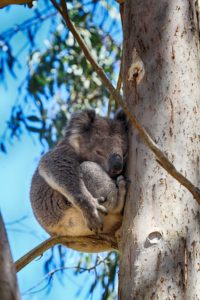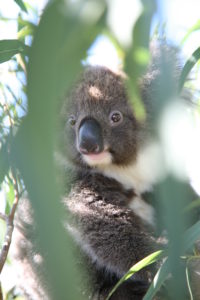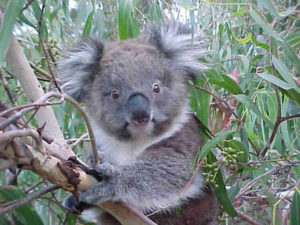Scholarships announced by the Conservation Ecology Centre
 The Conservation Ecology Centre is delighted to announce a new Scholarship Program to support researchers dedicated to long term conservation outcomes based on rigorous science.
The Conservation Ecology Centre is delighted to announce a new Scholarship Program to support researchers dedicated to long term conservation outcomes based on rigorous science.
Chief Executive, Lizzie Corke, says “The CEC operates efficiently and effectively to achieve our vision of an Otways once more vibrant with wildlife. Our approach is science based conservation that works and this scholarship program will provide valuable support to research students, increasing knowledge for sustainable conservation of wildlife and habitats in the Otways.”
Scholars will be co-supervised by Conservation & Research Manager, Dr Jack Pascoe, and the scholarships of up to $5,000 will support Honours or Masters level students conducting research projects commencing in either first or second semester 2016. PhD candidates may also make contact to discuss opportunities.
“We acknowledge the generous support of the Conservation Ecology Centre’s Eco-Allies and Leisure Solutions in providing the funds to support this vital work” says Lizzie Corke.
Learn more about the Conservation Research Scholarships and how to apply.
This year, with your help, we rediscovered endangered Tiger Quolls in the Otways and initiated the Otways Conservation Dogs Project and Humane Fox Management Program. We have embarked upon an ambitious program, investigating and addressing koala habitat decline – an issue seriously threatening koalas in Victoria. You have also helped us to rescue and rehabilitate hundreds of injured and orphaned animals so that they can be returned to the wild.
Our supporters play an incredibly important role in the work of the CEC and we deeply value your involvement and commitment to wildlife conservation. Thanks to you, we have purchased a key piece of land at Cape Otway – the first stage in creating a vital wildlife corridor. It is a very special Christmas gift for the wildlife of the Great Ocean Road!
Spoil someone special with a Great Ocean Ecolodge Gift Voucher – order now. Perhaps a piece of handmade jewellery to support Tiger Quoll conservation? See the range and place an order here. These gifts are great under the tree or can be posted easily – Gift Vouchers can even be sent electronically for super Christmas speed. Because all profits go directly to support CEC conservation programs you will be giving a gift to the wildlife at the same time!

Can you see Father Christmas yet?
Thank you for sharing 2012 with us. Warmest wishes for the festive season and a fabulous New Year!
Learn more about the Tiger Quoll Conservation Program and Otways Conservation Dogs
Learn more about the Koala Conservation Program
Learn more about Manna Gum Reserve
Support Australian wildlife this Christmas – make a donation
At Cape Otway on the Great Ocean Road manna gum woodlands are declining rapidly and hungry koalas gaze down from skeletons of dead and dying trees. The local community have observed the progression with mounting alarm and are working together to address it.
The Conservation Ecology Centre, based at Cape Otway, is investigating the issue through an Australian Government Biodiversity Fund Grant. It seems the issue is more complicated than simply the impact of koalas, but how complex is it?
 Koalas are native to the region, though historically they were in lower numbers than at present, and in the 1980’s additional animals were released at Cape Otway from French Island. The trees have been declining over the last ten years.
Koalas are native to the region, though historically they were in lower numbers than at present, and in the 1980’s additional animals were released at Cape Otway from French Island. The trees have been declining over the last ten years.
Due to the size of both the area and the koala population, sterilisation of koalas is unlikely to result in significant decreases in the population or improvements in the woodlands at Cape Otway. Translocation of koalas to other areas of habitat is also problematic, with few, if any, suitable areas available and the potential to spread the problem. The cost of either approach would be huge as would be the stress to the individual koalas. The future of the koalas and the manna gums depends instead on careful management of the habitat.
One of the greatest concerns for the future is the lack of young trees. “While the older trees are declining and dying, there are no young trees growing to replace them,” Dr Jack Pascoe, Conservation Coordinator at the Conservation Ecology Centre explains. “In the most affected areas the natural understorey of native grasses and wildflowers has been overtaken by coastal scrub, but, where seedlings have been hand planted in areas without coastal scrub these have grown into young trees which are thriving and coping with the koalas well.”
The Conservation Ecology Centre recently held a forum attended by experts from around the country including eucalypt dieback experts, koala ecologists, botanists and leaf chemists to consider these issues. Potential causes for these issues were considered and the CEC has initiated investigations into them.
“Fire is probably a very important element in this ecosystem and it has been missing for a long time now. This lack of burning means that coastal scrub is now expanding into areas which have traditionally been woodlands. The grassy understorey of the woodland is being replaced by shrubs, inhibiting the trees and preventing recruitment. Reintroducing fire to the landscape may well initiate many processes such as recruitment of young trees” said Dr Pascoe.
“Koalas favour some trees over others and understanding this may assist with helping trees to withstand koala pressure. Eucalypts like the manna gum produce chemicals to deter animals from eating them and the CEC is working with the University of Western Sydney to study the relationship between leaf chemistry and tree health. Improving the health of a tree could encourage it to produce more defences against koala browsing.”
“The CEC’s research team is already investigating effective ways of initiating recruitment and tree health with small contained burning efforts and the potential for simulating the effects of fire. We also plan to research the leaf chemistry of manna gums in all growth stages and under varying degrees of tree stress and decline to gain insights into the stress process and its impact on browsing pressure” explained Dr Pascoe.
“The trees are dying and we need to act quickly” said CEO Lizzie Corke, “We are collecting seed from surviving trees, planting manna gum seedlings and building resilience in the koala habitat across Cape Otway. We are looking forward to extending this work across Manna Gum Reserve, a property the CEC is working towards purchasing with help from The R.E. Ross Trust (we still need to raise $28,000). Research is vital for understanding the issue and we hope that our findings will guide us in combating the decline of the woodlands and effectively restoring this threatened habitat as well as assisting with managing similar issues around the country.”
We are delighted to announce that today the title for this special piece of land was transferred to the Conservation Ecology Centre. It is the first, very exciting step in creating an important habitat corridor and a safe haven for koalas and other wildlife.
 We have very nearly raised all the funds required to finalise the purchase but are not quite there yet. In view of that, we have negotiated an arrangement with our neighbours who are selling the property to pay the balance of the price to them over a period of time – we are very grateful to them for being so flexible. Until the full amount is paid, our neighbours will continue to have access to the property for their farming activities. Once the balance is paid, we will be able to commence our work to restore the habitat to transform the property into Manna Gum Reserve, providing for the safe movement of wildlife across Cape Otway.
We have very nearly raised all the funds required to finalise the purchase but are not quite there yet. In view of that, we have negotiated an arrangement with our neighbours who are selling the property to pay the balance of the price to them over a period of time – we are very grateful to them for being so flexible. Until the full amount is paid, our neighbours will continue to have access to the property for their farming activities. Once the balance is paid, we will be able to commence our work to restore the habitat to transform the property into Manna Gum Reserve, providing for the safe movement of wildlife across Cape Otway.
With your help and a very generous grant from The R.E. Ross Trust we have already raised $116,185 and have just $28,815 to go! To help raise this final amount you can donate easily and securely online or call (03) 5237 9297. We can’t wait to invite you to see the little Manna Gums growing!
 Right now, koalas in Cape Otway have a reason to hope. After an incredible show of public support, the Conservation Ecology Centre (CEC) is close to raising enough funds to purchase a piece of land that will be transformed into a haven for koalas and other native animals. CEC Patron, the Hon. Steve Bracks AC, couldn’t be happier:
Right now, koalas in Cape Otway have a reason to hope. After an incredible show of public support, the Conservation Ecology Centre (CEC) is close to raising enough funds to purchase a piece of land that will be transformed into a haven for koalas and other native animals. CEC Patron, the Hon. Steve Bracks AC, couldn’t be happier:
“This part of Australia has long been close to my heart and holds incredible potential for the future of our native wildlife. I’ve been truly inspired by the support Australians have shown for the project so far.”
The CEC, a conservation and wildlife rehabilitation centre, launched the fundraising drive in April with a visionary plan. Once the land is purchased, they will turn it into the ‘Manna Gum Reserve’ – a habitat corridor for Australian wildlife and a model for future habitat restoration.
Mr Bracks explains:
“The creation of the Manna Gum Reserve will increase natural habitat areas, augment the link between the Great Otway National Park and the Conservation Ecology Centre and enhance the Centre’s conservation work. A public walking track will also provide locals and tourists an insight into the importance of this area. With only two weeks left to secure the funds,we’re hoping Australians will continue to get behind this fantastic project.”
A generous grant from The R E Ross Trust combined with the first rush of public support has brought the CEC close to their goal of $145,000. But there is still a way to go. By June 30, another $35,000 is needed.
The Conservation Ecology Trust welcomes sponsorship and donations. Contributions to this landmark conservation effort will enable the restoration and revegetation of this
important piece of Australia and ensure it remains protected for future generations to enjoy.
With the end of the financial year fast approaching and all donations over $2 being tax deductible in Australia, now is the perfect time to lend your support.
Thanks to a Parks Victoria Healthy Parks Healthy People Community Grant, the Conservation Ecology Centre will be undertaking a survey of koalas and their habitats in 2012. We will be collecting information which will provide insights into the koala population and how their habitat has changed over the last 12 months, carrying out soil tests and habitat condition assessments.
Join us on:
Thursday 23rd, Friday 24th and Saturday 25th February
Thursday 8th, Friday 9th and Saturday 10th March
There will be a training session on the first day as a refresher and for any new team members. Contact us to let us know if you are interested in getting involved on any (or all!) of these dates.
Of course the surveys will be lots of fun with good food, good company and beautiful field sites!
